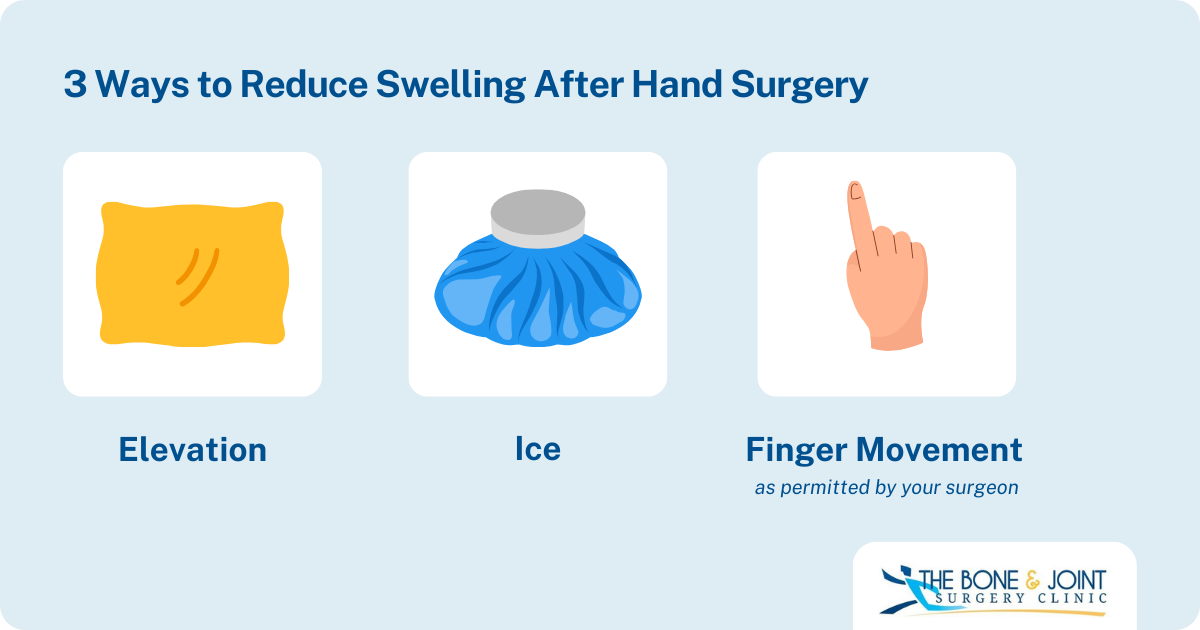How Long Does Swelling Last After Hand Surgery?
Swelling is normal after hand surgery, and it typically lasts for about one week.
Reducing swelling will not only help ease your pain, but it will also help you heal.
We’ll give you some tips on how to reduce swelling as well as explore some common hand surgeries and some things your hand surgeon at Raleigh Bone and Joint Surgery Clinic wants you to know.
How to Reduce Swelling After Hand Surgery
As we mentioned earlier, it’s natural to have some swelling after the surgery, but this should not last for a prolonged period. You’ll find that as your swelling reduces, so does your pain. This is a sign that your hand is healing.
Following are some ways to help reduce hand swelling after surgery:

Elevation
It’s important to elevate your arm above your heart. Often, you can do this comfortably by lying on your back and gently resting your hand on several pillows. You should keep your hand elevated for several days after surgery.
You may find it challenging to find a good sleeping position after hand surgery. That’s why we’ve provided several useful tips in an earlier blog.
Ice
Applying an ice pack can also bring down swelling and inflammation. This also relieves pain by dulling the nerve signals sent to your brain.
Remember: Do NOT place ice directly on your skin. Instead, wrap it in a towel. You can use ice even if you have a splint or bulky dressing if you’re able to keep these completely dry.
Finger Movement
We need to place an important caveat here: This depends upon the type of hand surgery you have had and what parts of your hand have been affected. In general, if it’s okay to move the fingers, they will be outside the surgical dressing.
Gently bending your fingers toward your palm and extending them will help minimize swelling.
However, you should first speak with your hand surgeon to see if finger movement is permitted.
Common Hand Surgeries
Our hand and wrist specialists treat a variety of conditions. Some of the most common surgeries we perform include:
-
-
- Carpal tunnel surgery
- Treatments for fractures/ dislocations (if surgery is required)
- Ganglion cyst removal
- Trigger finger surgery. Trigger finger causes pain, stiffness and a “locking” sensation when you bend and straighten your finger.
- Dupuytren’s contracture surgery
- Joint replacements
- Tendon and nerve repairs
-
However, we want to be clear that just because you’re having issues with your hand doesn’t always mean you’ll need a hand surgeon. We only operate when nonsurgical treatment options haven’t been successful.
3 Things Your Hand Surgeon Wants You to Know
1. Not every visit to the hand doctor results in surgery.
At the Raleigh Bone and Joint Surgery Clinic, we take a conservative approach to medicine. This means that we will try nonsurgical methods to treat you first. It is only when those methods fail to provide relief that we will consider surgical options.
2. Don’t delay in getting treatment.
Sure, some minor aches and pains can resolve themselves with home treatment and support. But they shouldn’t last for three or four weeks. Delaying treatment can result in more extensive damage. If you have weakness or numbness, you should also give us a call.
In addition, you should always schedule an appointment if you can’t put weight on your leg or if you’ve heard a pop after a fall or injury.
3. It’s vital to follow through with physical therapy.
Physical therapy is an important part of your recovery. Following our treatment plan will ensure the best results and a smooth transition into regular activity.
Raleigh Bone and Joint Surgery Clinic: Treating Hand Conditions to Get You Back in the Game
The hand is an intricate connection of bones, tendons and ligaments. When one of those is injured, it can not only affect your entire hand, but it can make your everyday tasks difficult or even impossible.
This is why it’s important to select a hand and wrist specialist in Raleigh with the extensive scope of experience, like our physicians at Raleigh Bone and Joint Surgery Clinic. All our orthopedic surgeons are board-certified and maintain advanced training in their sub-specialties. Plus, we always have a physician on call 24/7 to help our patients.
But we also realize that medical excellence is only part of the equation: We are dedicated to providing the highest level of compassionate care that focuses on treating the whole patient. We want to get to the heart of your problem so you can begin your journey of healing.
For decades, we’ve been the leading orthopedic practice in the Triangle area—and one of the few that are independent and community-based.
We would welcome the opportunity to serve you. Please contact us for an appointment.




